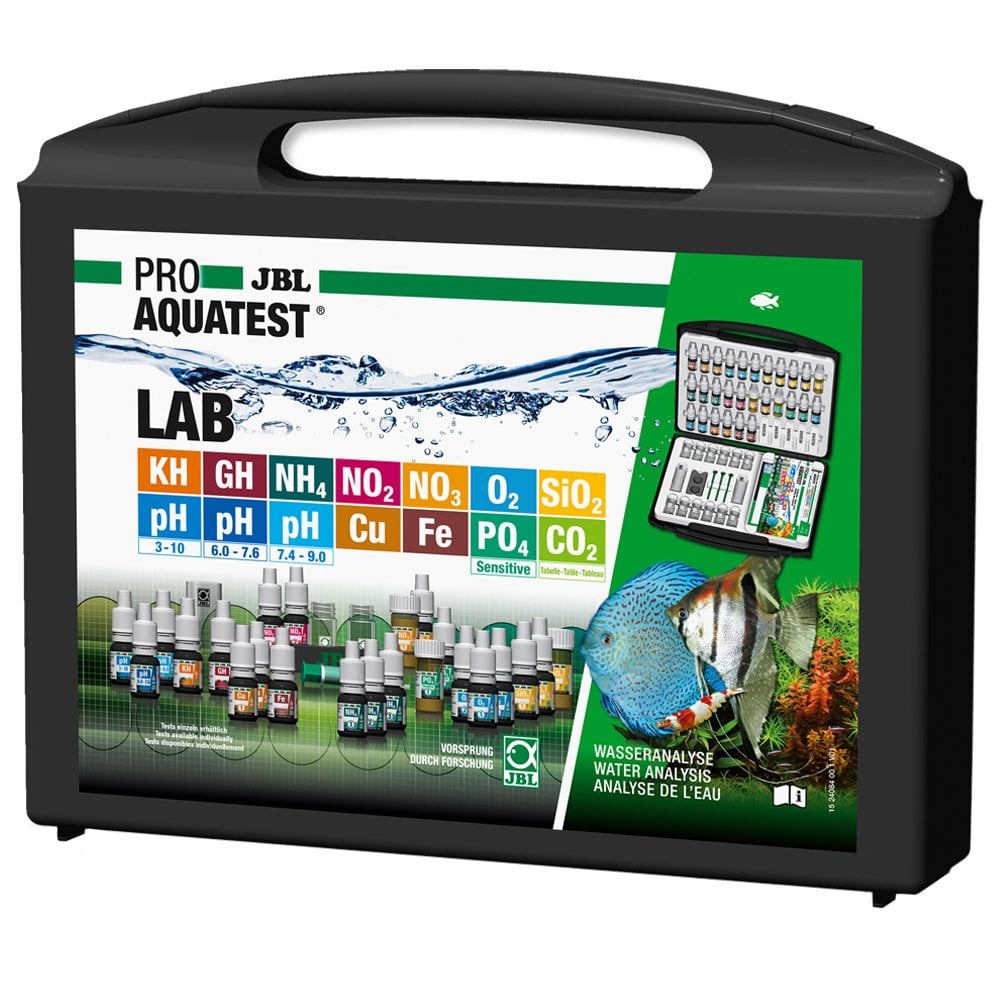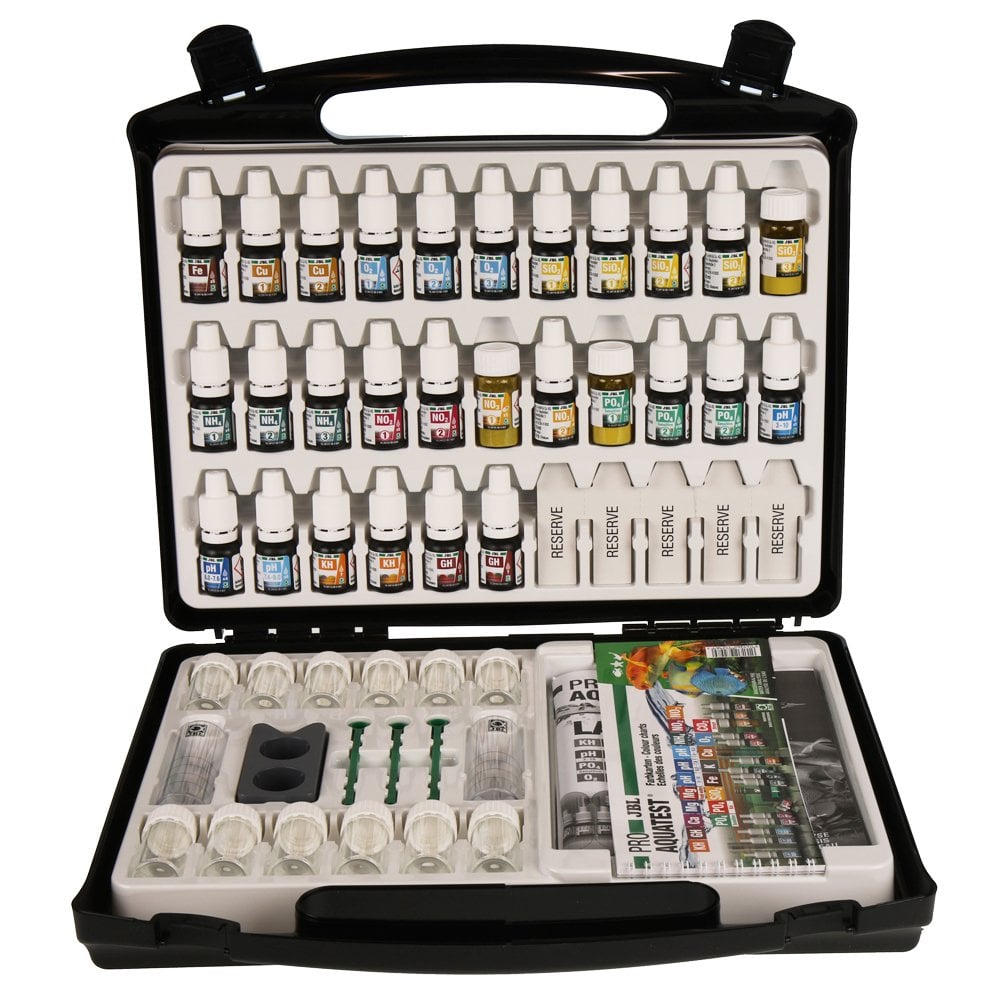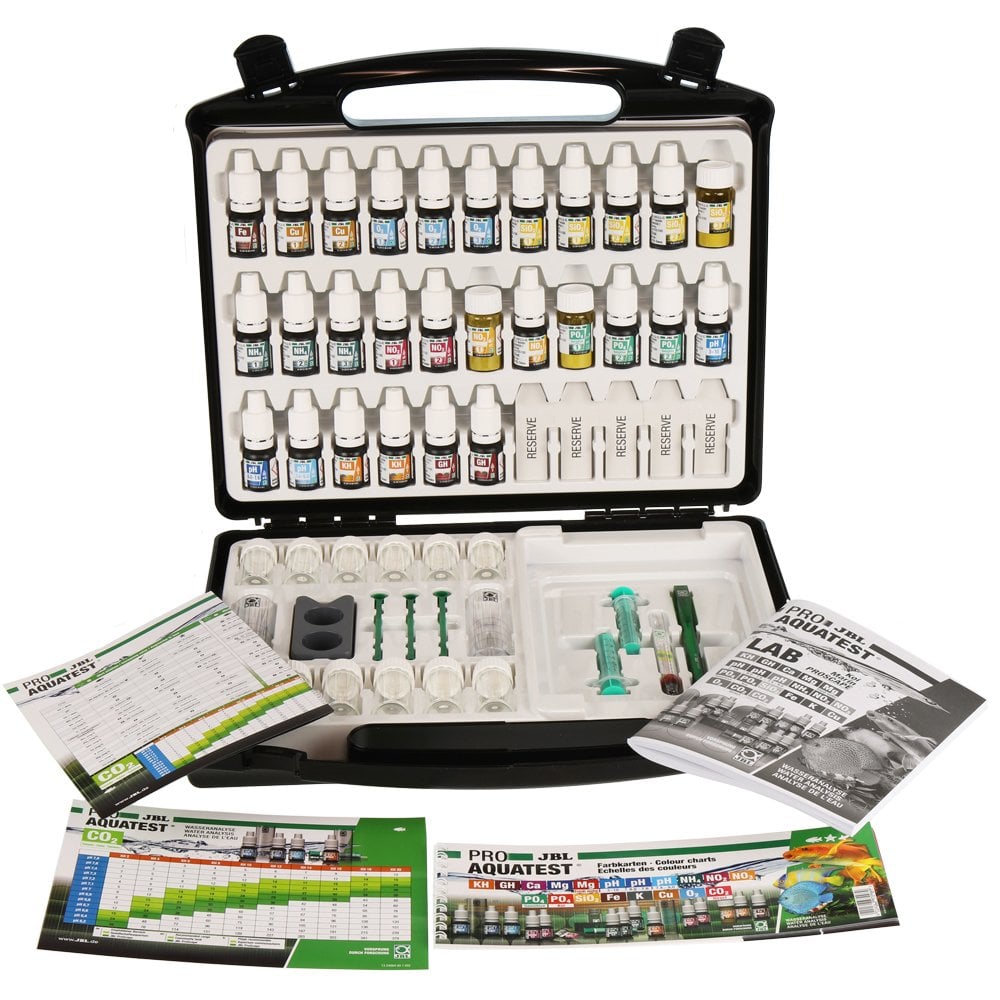-
Same Day Dispatch On orders placed before 2pm
-
Our Customers Love Us Platinum Trusted on Feefo
-
Dedicated Customer Support Call us on 01642 612 419
-
Pond Points Loyalty Scheme 2 Points for every £1 spent online
JBL ProAquaTest Lab - Aquarium Test Kit
ProAquaTest Lab - Aquarium Test Kit
Product Code: 2408417
- Complete professional aquarium testing kit
- Precise testing of the 13 most important water parameters
- Tests for KH, GH, NH4, NO2, NO3, O2, SiO2, pH, Cu, FE, K, PO4 & CO2
- Simple and easy to use comparator system for clear and precise readings
- Supplied in a weather-proof carry case
- Includes vials, syringe, dosing spoon, comparator block & reagents
Couldn't load pickup availability
Description
Description
The JBL ProAquaTest Lab provides simple yet reliable monitoring of water values in aquariums. The ProAquaTest Lab tests for the the most important water parameters including pH (3 ranges), carbonate hardness, general hardness, ammonium/ammonia, nitrite, nitrate, phosphate, iron, copper, silicate, oxygen, and, with the help of a table, CO2.
The right water values depend on the fish stock and the plants in the aquarium. Even if the water looks clear it can be contaminated. Bad values can cause diseases or algae in the aquarium. To maintain a healthy aquarium with conditions close to nature it is important to check and adapt the water values regularly. With JBL water tests you can determine all the relevant water values quickly, easily and very precisely.
JBL ProAquaTest Lab Contents: plastic carry case, incl. 13 tests, 12 glass vials, 2 syringes, 3 measuring spoons, thermometer, comparator block, 2 plastic cuvettes, colour charts, CO2 table, pen, report sheets and operating instructions.
Precise measurement of the following values:
- pH test: Water acidity from 3.0 to 10
- pH test: Water acidity from 6.0 to 7.6
- pH test: Water acidity from 7.4 to 9.0
- O2 test: Determines the oxygen content
- CO2 test: Determines the carbon dioxide content for thriving plant growth
- GH test: Determines the general hardness
- KH test: pH stability of the water (carbonate hardness)
- PO4 test: Determines the phosphate content (reason for algae growth and plant nutrient)
- Test NH4 / NH3: Identifies non-toxic ammonium, uses table to determine any toxic ammonia
- NO2 test: Determines nitrogen compound nitrite, which is toxic for the fish
- NO3 test: Determines the nitrate content (reason for algae growth and plant nutrient)
- Fe test: Determines the iron content to monitor fertilisation
- K test: Determines the plant nutrient potassium
- Cu test: Determines heavy metal deadly for invertebrates. Also important for adjusting the dose of therapeutic medications
- SiO2 test: Determines the silicates (silicic acid), which cause diatoms
To determine the CO2 content, you just need to measure the pH and KH values. These two values will give you the CO2 content in the water, which then can be referenced from the enclosed table.
Delivery & Returns
Delivery & Returns
Cut Off Time
Order by 2pm Monday to Friday for same day dispatch (Excluding Bank Holidays).
Direct/Palletised Delivery items may take longer.
Orders Under £49
Standard Delivery (2-3 working days) - £3.99
Express Delivery (1-2 working days) - £5.99
Orders Over £49
Standard Delivery (2-3 working days) - FREE!
Express Delivery (1-2 working days) - £2.99
Timeframes are for standard mainland UK addresses only excluding NI, Scottish Highlands & Islands.
Palletised Deliveries
Some large oversize products, typically items weighing more than 30kg, may require delivery via pallet and as such will arrive as a kerbside delivery only. The drivers in these instances are unfortunately not permitted to assist with the pallet beyond the drop off, and cannot aid in bringing packages into the property.
Pond Planet will contact you to book in delivery on a suitable working day. Delivery will generally take place between 9am and 5pm. To ensure there are no delays with delivery, please include a contact number when placing the order.
Pond Plant Deliveries & Surcharge
Pond plants are subject to a £5.99 delivery surcharge. Pond plants are sent directly from our supplier to make sure the plants you receive are fresh and in great condition. There is no limit on how many you can order for a single delivery charge. This charge is in addition to any other carriage costs for items sent directly from Pond Planet. Please allow 5 -10 working days for delivery.
Returns
If for any reason you are not satisfied with your purchase from Pond Planet, you may return the product(s) to us within 14 days of the purchase date for a refund or exchange.
Goods must be returned in perfect and unused condition, in their original packaging. The buyer must ensure that the goods are securely and adequately packed to avoid damage and the purchaser pays all postage costs. We recommend that products are returned by recorded delivery or by a carrier that requires a signature. Pond Planet accepts no responsibility for goods returned to us unless signed proof can be provided.
-
Same Day Dispatch On orders placed before 2pm
-
Our Customers Love Us Platinum Trusted on Feefo
-
Dedicated Customer Support Call us on 01642 612 419
-
Pond Points Loyalty Scheme 2 Points for every £1 spent online



Get Expert Advice
If you have any questions or queries regarding our products or services please do not hesitate to get in touch. Our helpful team of experts are waiting on hand and want to hear from you!
Good kit, good price

Loyalty Pays!
As a thank you from us to you, we have launched our loyalty point scheme, so you can get the best out of what you spend online!



